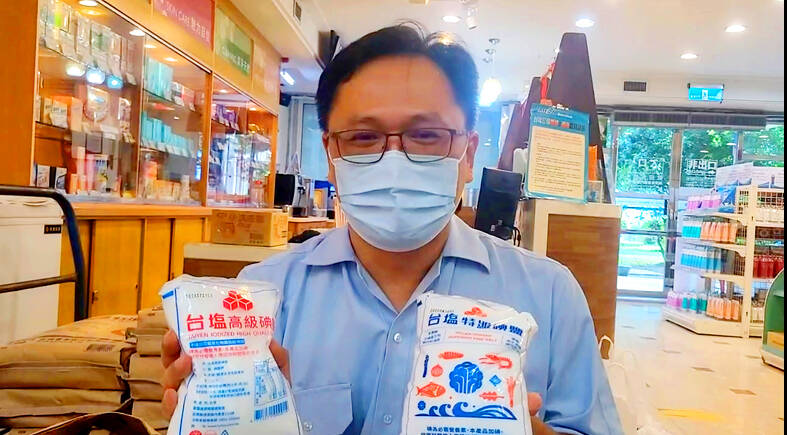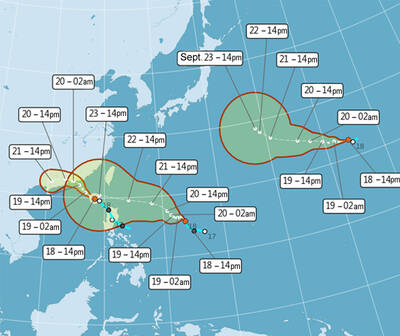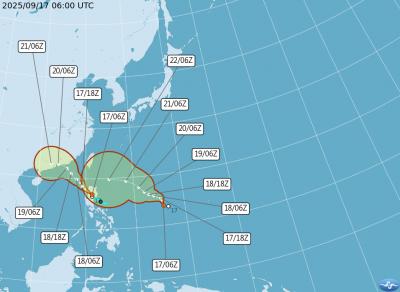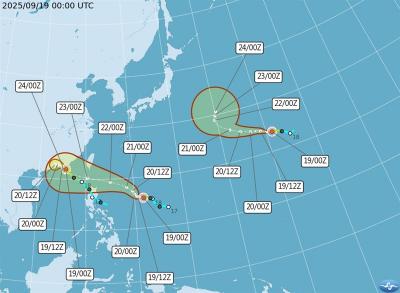The nation’s largest salt producer has said that it has sufficient stock to meet local demand, while local authorities said that programs are in place to regularly monitor food safety amid concern over the impact of Japan’s discharge of treated wastewater from its decomissioned Fukushima Dai-ichi nuclear power plant.
Recent news reports said people in some cities were snatching up salt products in supermarkets, especially Taiyen Biotech Co’s (台鹽) “iodized high quality salt.” Reporters checked out several Carrefour and Pxmart stores and found that some outlets had run out of Taiyen salt, while store employees confirmed that people had been snatching up 1kg bags of salt.
When asked, customers told reporters that they were stocking up on salt to avoid buying or digesting “salt from Japan, which might have radioactive contamination.”

Photo: Tsai Cheng-min, Taipei Times
A popular belief that iodized salt can protect against radiation has also sparked salt buying sprees in South Korea and China in the past few days.
Executives at Taiyen, formerly a state-controlled enterprise known as Taiwan Salt Co, told reporters that all of the company’s products were produced before Japan on Thursday last week began releasing treated wastewater from the Fukishima plant into the sea.
The Atomic Energy Council said that programs are in place to continue monitoring radiation levels around Taiwan’s waters, and so far, testing results indicated that all radioactive indicators were within normal levels.
The council’s Institute of Nuclear Energy Research’s radiation laboratory has also been testing samples of food products for possible radiation contamination, but none have shown abnormal levels of iodine, cesium, strontium, tritium or other radioactive elements, government officials said.
Scientists at Tunghai University’s applied physics department have posted on social media to allay public concerns about radiation contamination.
Taiwan’s standard for water content in “high quality salt” is set at below 0.5 percent, and at below 3 percent for regular quality salt, while the WHO sets the limit for tritium in water at 10,000 becquerels per liter.
“As people are recommended to drink two liters of water each day, each person would have to consume 444kg of salt made from tritium-containing wastewater discharge from the Fukushima nuclear power plant to exceed the WHO’s limits,” the scientists wrote.
Taiyen also released a statement saying that it had distributed extra stocks of salt at the end of last month in anticipation of high demand during Ghost Month — which falls on Aug. 16 to Sept. 14 this year — so all major sales channels and retailers should have sufficient supply.
“Taiwan’s domestic demand for refined salt is about 100,000 tonnes each year. Our plant — Tung-Hsiao Electrodialysis Refined Salt Factory in Miaoli County — was the main production site and when it was still a state enterprise, had an annual capacity of 100,000 tonnes,” it said.
“After the firm was privatized in 1995 and opened to market competition, annual output dropped to about 70,000 tonnes. However, it can boost production when needed. As such, salt supply remains normal and the public can be assured of quality products,” it said.
Additional reporting by Jason Pan

PEAK MONTHS: Data showed that on average 25 to 27 typhoons formed in the Pacific and South China seas annually, with about four forming per month in July and October One of three tropical depressions in the Pacific strengthened into a typhoon yesterday afternoon, while two others are expected to become typhoons by today, Central Weather Administration (CWA) forecaster Lee Ming-hsiang (李名翔) said yesterday. The outer circulation of Tropical Depression No. 20, now Typhoon Mitag, has brought light rain to Hualien, Taitung and areas in the south, Lee said, adding that as of 2pm yesterday, Mitag was moving west-northwest at 16kph, but is not expected to directly affect Taiwan. It was possible that Tropical Depression No. 21 would become a typhoon as soon as last night, he said. It was moving in a

A Taiwanese academic yesterday said that Chinese Ambassador to Denmark Wang Xuefeng (王雪峰) disrespected Denmark and Japan when he earlier this year allegedly asked Japan’s embassy to make Taiwan’s representatives leave an event in Copenhagen. The Danish-language Berlingske on Sunday reported the incident in an article with the headline “The emperor’s birthday ended in drama in Copenhagen: More conflict may be on the way between Denmark and China.” It said that on Feb. 26, the Japanese embassy in Denmark held an event for Japanese Emperor Naruhito’s birthday, with about 200 guests in attendance, including representatives from Taiwan. After addressing the Japanese hosts, Wang

One of two tropical depressions that formed offshore this morning could turn into a moderate typhoon by the weekend, the Central Weather Administration (CWA) said today. Tropical Depression No. 21 formed at 8am about 1,850km off the southeast coast, CWA forecaster Lee Meng-hsuan (李孟軒) said. It is expected to move in a northwesterly direction as it continues building momentum, possibly intensifying into Typhoon Mitag this weekend, she added. The radius of the storm is expected to reach almost 200km, she said. It is expected to approach southeast of Taiwan on Monday and pass through the Bashi Channel between Tuesday and Wednesday,

Three tropical depressions yesterday intensified into tropical storms, with one likely to affect Taiwan as a typhoon, the Central Weather Administration (CWA) said. The three storms, named Mitag, Ragasa and Neoguri, were designated as storms No. 17 to 19 for this year, the CWA said. Projected routes indicate that Ragasa is most likely to affect Taiwan, it said. As of 2am today, Ragasa was 1,370km east-southeast of Oluanpi (鵝鑾鼻) on the southernmost tip of Taiwan. It was moving west-northwest before turning northwest, slowing from 11kph to 6kph, the agency said. A sea warning for Ragasa is unlikely before Sunday afternoon, but its outer rim